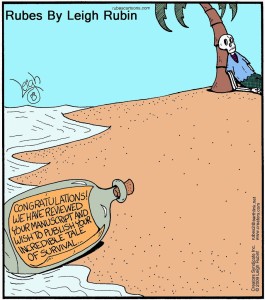This isn’t going to be news to most of you who are regular readers of The Kill Zone but it’s good advice for anyone who is trying to get published. Heck, it’s good advice if you are trying to STAY published. And we all need to be reminded of it once in a while. Here it is:
You have to be tough.
How tough? You have to have the hide of a
The tenacity of a
And the drive of a
But even with all those qualities, you are going to get rejected. It happens to all of us. And it never stops. Even after you sign your first contract, you will deal with it. Your editor will make you rewrite. The marketing department will veto your title. (Heck, one of ours got nixed by the buyer at Walmart). Barnes & Noble will stock you but Costco won’t. You won’t get reviewed or worse, you’ll get panned. You work like a dog to put your ebook on Amazon and you sell four books…three of them to your mom. And someday, you will be stalking some poor reader in the bookstore, see him pick up your book [YES! THEY LIKE ME, THEY REALLY LIKE ME!] and he will put it back on the shelf [NO! WHY DO YOU HATE MY BOOK?]
Rejection is a staple of the writer’s life, so no matter where you are on your path, you might as well begin to come to grips with it. Even after you are published with a decent track record, you can still get dumped on.
Rejection begins, of course, with query letters. This is a painful thing, the query process, because the agents who are rejecting you are usually maddeningly oblique about why they are giving you the thumbs down. Here’s some examples of coded rejections I have seen:
1. “This doesn’t fit my needs at this time.”
2. “Your writing is strong but I don’t feel I can be enthusiastic enough to fully get behind this project.”
3. “I’m afraid I will have to take a pass. But I am interested in seeing other projects…”
What they really mean:
1. You can’t write.
2. I already have four authors who write zombie Lesbian detective series.
3. DaVinci Code rip-offs are yesterday’s news. Have you considered paranormal YA?
I don’t mean to make light of your woes if you are going through any phase of rejection now. But believe me, I have been there. My entry into this business took place during the Ice Age when it was possible to still submit to editors without having an agent. (ie the Slush Pile). But the rejections were still as awful. I used to have all of them — kept them in an old manila envelope in a desk drawer. Then when we moved a couple years ago, I finally threw all the rejection letters away. Except for the first one I ever got, which I keep framed above my desk:
It is a classic. It doesn’t reproduce well here, so let me point out some really nifty things about this particular rejection letter. First, it’s a form letter. Second, there is no date. Third, there is no signature. But someone WAS kind enough to pencil in my last name and even take a moment to cross out “Sir.” I think this rejection letter is circa 1980. But you’ll notice the language has not changed since. The inserts are how I felt at the time:
Dear Ms. Montee,
We thank you for the opportunity [yeah, right!] to consider your proposal or manuscript. [what, they can’t figure out WHICH?]. We are sorry [I’ll bet!] to inform you that the book does not seem a likely prospect [how elegant!] for the Dell Book list. Because we receive many individual submissions every day [you think I care how overworked you are?] it is impossible for us to offer individual comment [I’d say so since there is no human being attached to this letter to begin with!] We thank you for thinking of Dell [insert sound of raspberry here] and we wish you the best of success [ie don’t darken our doorstep again with your crap] in placing your book with another publisher. [you’ll be sorry some day!]
Sincerely, [you’re kidding, right?]
The Editors [aka the evil Manhattan cabal trying to keep me unpublished]
So why did I keep this one? Well, with the passage of more than two decades I have gained a certain perspective about it. The manuscript I sent to Dell was really really bad. It had no business going out in the world in the state it was in. I know, because I kept it. Like this rejection letter, I kept it to remind me that this is a learning process. It still is. It always will be.
So if you are feeling blue today about rejection, just know this one thing: You are not alone. Pearl Buck’s novel “The Good Earth” was rejected on the grounds that Americans were “not interested in anything on China.” A editor passed on George Orwell’s “Animal Farm,” explaining it was “impossible to sell animal stories in the U.S.A.” And let’s not forget the agent who dumped Tony Hillerman and told him to “get rid of all that Indian stuff.”
Keep plugging away at your craft. Grow a tough hide, be brave, don’t give up, don’t be too timid to send your book out there for scrutiny. You can’t hit a home run — or even a blooper single — if you never step up to the plate. And even if you are in the batter’s box, don’t keep backing out because you’re afraid of getting beaned. Derek Jeter’s been hit by a pitch 184 times in his career. You think he’s afraid of a little chin music?
And lastly, have a little faith. Shoot, have a lot of faith:
Because it only takes one “yes” to make all the no’s bearable.






